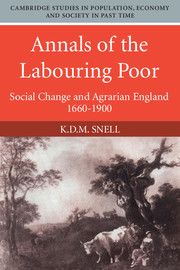Book contents
- Frontmatter
- Contents
- Preface
- Introduction
- 1 Agricultural seasonal unemployment, the standard of living, and women's work, 1690–1860
- 2 Social relations – the decline of service
- 3 Social relations – the poor law
- 4 Enclosure and employment – the social consequences of enclosure
- 5 The decline of apprenticeship
- 6 The apprenticeship of women
- 7 The family
- 8 Thomas Hardy, rural Dorset, and the family
- Appendix: yearly wages
- Bibliography
- Index
- Cambridge Studies in Population, Economy and Society in Past Time 2
7 - The family
Published online by Cambridge University Press: 05 March 2012
- Frontmatter
- Contents
- Preface
- Introduction
- 1 Agricultural seasonal unemployment, the standard of living, and women's work, 1690–1860
- 2 Social relations – the decline of service
- 3 Social relations – the poor law
- 4 Enclosure and employment – the social consequences of enclosure
- 5 The decline of apprenticeship
- 6 The apprenticeship of women
- 7 The family
- 8 Thomas Hardy, rural Dorset, and the family
- Appendix: yearly wages
- Bibliography
- Index
- Cambridge Studies in Population, Economy and Society in Past Time 2
Summary
A number of familial changes emerged in earlier chapters. These included the reduction of agricultural ‘live-in’ servants in husbandry and of ‘live-in’ apprenticeships, the possible effects of enclosure on marriage age, and the agricultural and artisan sexual division of labour. I want now to look specifically at the familial effects of such changes, and to discuss other aspects of family life. These will include the idea of the family; ages at which children left home; the notion of ‘adulthood’ in the past; generational and occupational settlement patterns and their influence on the meaning of ‘community’ family formation by occupation; factors influencing the age of marriage; attitudes to marriage and sex; the domestic division of labour; the family poverty cycle; family break-up and desertion; kin connections and the effect of the poor law on these; and the changing quality of family life. These issues help to place some of our current priorities in historical perspective, and are of major importance to family history. But they also enter (sometimes problematically) into an assessment of the standard of living. I hope to place them more closely within their social and economic context than has been possible in much family historiography.
What is meant by the ‘idea of the family’? Ann Smith, married to a publican who had deserted her, found herself examined as to settlement in Bedford, in 1777.
- Type
- Chapter
- Information
- Annals of the Labouring PoorSocial Change and Agrarian England, 1660–1900, pp. 320 - 373Publisher: Cambridge University PressPrint publication year: 1985

